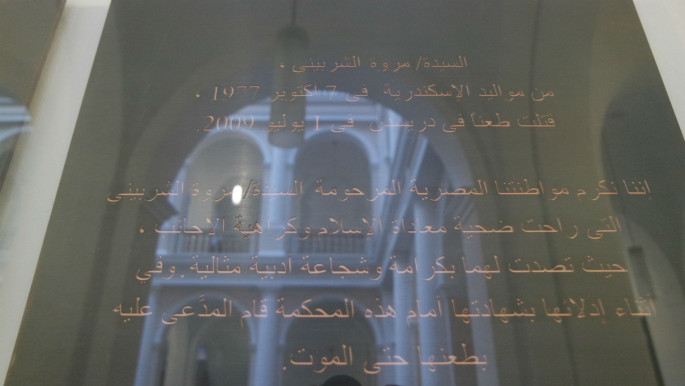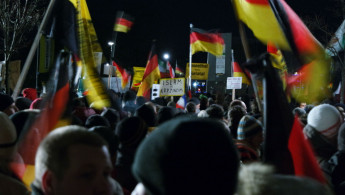Racial fissures as Dresden struggles with Pegida’s popularity
In Dresden’s local courthouse there’s a transparent plaque emblazoned with golden lettering and German and Arabic text.
The plague is dedicated to the memory of Marwa El Sherbini. In July 2009, Sherbini was stabbed to death in the courthouse by Alex Wiens, a Russian immigrant. Her husband, Elwi Ali Okaz, was also wounded as he tried to save his wife and his three-year-old son.
| I thank Pegida because they are part of the German people that took me into their homeland. - Sameh, Syrian refugee |
The solemn and simple memorial is tucked away in a corner near the entrance of the court. It reads:
‘We honour our late Egyptian citizen Marwa El Sherbiny who was the victim of an Islamophobic and racist attack which she resisted with dignity and exemplary courage and in her testimony in front of this court, the defendant stabbed her to death’.
El Sherbiny had been racially abused at a playground by Wiens when they disagreed whether it was her three-year-old son or Wiens’s niece’s turn on the swing. Hurling racial epithets in Russian and German he called her a terrorist and demanded that she removed her hijab. She called the police, they escorted her away and fined Wiens.
Wiens refused to pay the bill resulting in the fatal encounter in court. The judge, in his verdict, noted that Wiens voted and had supported the neo-Nazi National Democratic Party because “it was the only party that would ensure that Germany would be free of foreigners”.
 |
| The memorial plaque at the Dresden courthouse for Marwa El Sherbiny, who was murdered in the court room (Farid) |
Pegida protests
On Monday, days after the Paris attack on the offices of the satirical magazine Charlie Hebdo, Germany’s newest political movement Pegida (Patriotic Europeans against the Islamisation of the West) attracted a record 25,000 people to a march through Dresden’s centre. The march was one of a series of such marches that the far-right movement has been organising across Germany since its formation in October last year.
Saleh Ibrahim,46, is a member of Dresden’s Marwa El Sherbiny cultural centre and mosque, named after the murdered mother. While he did not underplay the message of Pegida, he also suggested it was “purely a politicised” movement.
"Pegida … sprung up from the vacuum left by the National Democratic Party which was in power for 25 years," he said. "We have nothing to fear as such. The mosque can have 24 hour security protection but if they decide to do something that’s up to God."
"I think there are serious political ambitions behind this movement and using Islam in a propagandistic manner is just to attract ordinary people who are disenchanted with their government."
The National Democratic Party, formed in 1964, is a far right party with neo-Nazi links. It espouses a trope of controversial views, including returning Germany to its former glory by claiming territory in Austria and a denial that the Holocaust happened. It also opposes the accession of Turkey to the European Union. But the NPD recently lost seats in the Saxon federal parliament and is seen to be lagging behind Pegida now for the right win vote.
Pegida has been successful so far in large part by not being too specific about its actual politics, thus casting its net wide among a German population concerned by unemployment and immigration.
Selim, 41, a Syrian café owner who has been living in Dresden since 1996, says that one of his good friends and a frequent customer attends the Pegida demonstrations on Mondays.
“We have been friends for years and he cannot connect that being against the so called Islamisation of Europe can affect me as a Muslim. I guess he does not see me as a Muslim but as a German that he feels open to discuss it with me. It’s complicated,” said the café proprietor, who did not want to give his full name.
According to a new study published Wednesday by the Dresden University of Technology, the typical Pegida supporter is middle class, employed, 48 years old and male. Professor Hans Vorlander, who conducted the study, suggests that political disaffection rather than embedded cultural or religious fears motivate the demonstrators to come out on a weekly basis to protest.
Asylum-seekers and the German political debate
One of the main demands of Pegida is that government acts to curb the influx of refugees and asylum seekers. Yet, just over 2 percent of the population of Dresden are foreigners and the city accepted around 2,000 refugees in 2014. Nationwide Germany opened its doors to 200,000 asylum seekers last year – many of them unsurprisingly from Syria and Iraq.
Sameh, 45, is a former high school principal from Deraa who came to Germany through the family repatriation scheme and arrived in Dresden only four months ago. He recounts how security forces detained him only twenty days before leaving Syria.
"I didn’t want to leave my country," he said. "But the situation in Deraa was dire. Life was extremely expensive. We had no electricity, no water, no phone lines, the internet was completely disconnected, no transport and above all no security."
Still, Sameh, who did not want his full name to appear, was grateful for his shelter. "I thank the German people whether they are Pegida supporters or not… I thank Pegida because they are part of the German people that took me into their homeland and if they do not want me here in their country that’s their opinion."
Sameh also suggested that if Pegida leaders and supporters understood why people were seeking asylum, they might not be so hostile.
"I didn’t hear of any of the Pegida leaders sitting down with a Syrian refugee asking them why we came to their country. I hope this. I hope so."
Potent legacy of racism
Perhaps such a face-to-face would make a difference. Perhaps not. On Thursday it emerged that an Eritrean refugee, Khalid Idris Bahray, had been murdered in Dresden just after the Pegida march. Police are still investigating but reports suggest the 20-year-old had been beaten to death.
Pegida may not be clear about its political goals. But a legacy of racism and violence taints German right wing movements and Dresden’s Muslims remain wary.
In contrast, the Marwa El Sherbiny mosque stands as a poignant reminder of the dangers of the kind of political and racial fissures Dresden is currently experiencing.
"We named the centre in Marwa’s honour as a public reminder that racism led to her ultimate demise and that this painful memory becomes part of Dresden’s memory," said Ibrahim.



